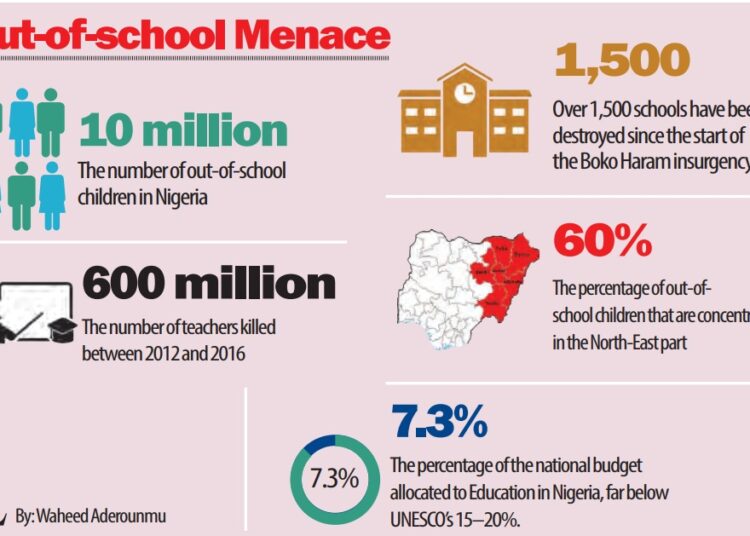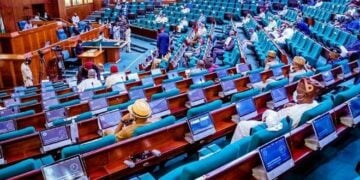Stakeholders have continued to raise concerns over the more than 10 million out-of-school children in Nigeria, with the majority concentrated in the northern region.
Many of these children, LEADERSHIP Data Miners learnt, were reportedly forced out of school due to insurgency and other forms of insecurity.
Many concerned citizens say the country is facing an educational catastrophe of terrifying proportions as millions of children have been forced out of classrooms, not by choice, but by terrorism, armed conflict, and other forms of violence, especially in the Northern region.
For instance, according to findings, between 2012 and 2016 alone, more than 600 teachers were murdered while performing the noblest duty in nation-building.
LEADERSHIP Data Miners learnt that most of the children are between the ages of five and 14, and over 60 per cent of these children are concentrated in the North-East, a region ravaged by years of insurgency, displacement, and deepening poverty.
Findings showed entire communities have been left without functioning schools in states like Borno, Yobe, and Adamawa. Over 1,500 schools have been destroyed since the start of the Boko Haram insurgency, with more than 19,000 teachers displaced and many too afraid to return.
Girls are particularly at risk, often forced into early marriage or domestic labour or sex work instead of being given a chance to learn.
An educationist based in Jos, Plateau State, Mrs Peace Pernam, said, “Education is a lifeline—crucial for breaking the chains of poverty, reducing insecurity, and fostering national growth. Yet, for millions of children in the Northeast, a cruel combination of conflict, cultural barriers, weak governance, and chronic underinvestment has severed their lifeline. These children are not just statistics—they are voices silenced, dreams deferred, and futures stolen. The United Nations Children’s Fund (UNICEF) has confirmed the unthinkable: Nigeria has the highest number of out-of-school children worldwide. A horrifying one in three Nigerian children is currently not receiving formal education.
“This is not just an education problem. It is a national emergency.
Without urgent, focused action, Nigeria risks raising a generation robbed of opportunity, voice, and agency—fueling a future of poverty, extremism, and instability.”
According to a public affairs analyst, Ahmed Idris, Nigeria’s education crisis is deepening, especially in remote areas where schools are scarce.
He said many children still walk long distances to school, if they attend at all.
And sometimes, there is a lack of teacher quality.
“Poor teaching quality leaves students unable to read or do basic math after years in school. To reverse this, the government must prioritise free, accessible Education and harness technology to bridge gaps.
Education is the key to reducing poverty, crime, and unemployment—building a skilled, informed, and empowered Nigerian future,’’ he said.
An Abuja-based educator, Peter Ojo, has warned that Nigeria cannot afford to overlook the looming threat an uneducated generation poses.
According to him, the correlation between education and economic progress is undeniable.
He said, “By prioritising education, the country can transform its youth into a force for positive change and national development. After all, solving any social problem in the long term must go through the education pathway.”
He further highlighted the chronic underfunding of education, with only 7.3 per cent of the national budget allocated to it, far below the UNESCO-recommended 15–20 per cent.
He fingered underfunding as a key factor contributing to dilapidated infrastructure, overcrowded classrooms, and inadequate teaching resources, adding that poor pupil-teacher ratios and a lack of basic amenities in schools compound these issues.
He, however, acknowledged recent progress made by some Nigerian states, such as Enugu, Jigawa, Kano, and Kaduna, which allocated over 26 per cent of their budgetary allocations to education in 2025.
In recent times, the federal and state governments and some private establishments are making efforts to tackle the menace of out-of-school children in Nigeria. Recently, the executive secretary of the Universal Basic Education Commission (UBEC), Aisha Garba, said the Commission would expand their enrolment and integration into the formal education system to reduce the number of out-of-school children in the country, particularly in rural communities.
She also stated that most of the out-of-school children are concentrated in rural areas and are predominantly from impoverished homes, with economic inequality fuelling poverty in many vulnerable households.
She stressed the need for more advocacy to address fundamental education challenges in Nigeria.
Also, the federal government has unveiled a new initiative, the Lumina Programme, to address the number of out-of-school children in Nigeria.
The minister of state for education, Prof. Suwaiba Ahmad Ahmad, explained that the programme would provide foundational literacy and numeracy education, especially targeting girls in hard-to-reach and underserved communities.
In Kaduna, the state government said it will train 8,700 School-Based Management Committee (SBMC) members to improve basic education in the state.
Acting executive chairman of the Kaduna State Universal Basic Education Board (KADSUBEB), Mubarak Muhammad, disclosed this in Kaduna recently.
Also, a nongovernmental organisation (NGO), IA-Foundation, raised N30 million at its recent annual charity gala in London to support the education of out-of-school children in Nigeria.
The founder of the IA-Foundation, Mrs Ibironke Adeagbo, said the fund would be deployed to help the body’s key initiatives directly.




